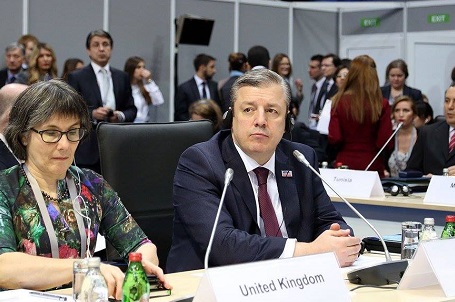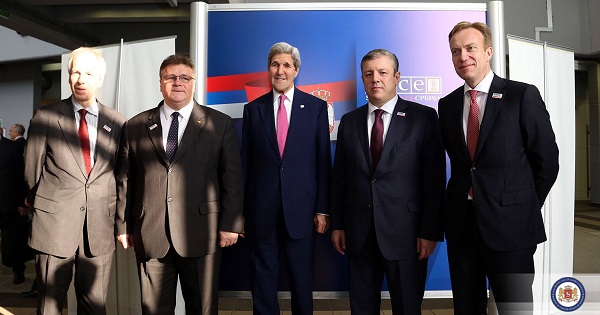Russia’s occupation of Georgia highlighted at OSCE Ministerial

Georgia’s Minister of Foreign Affairs Giorgi Kvirikashvili is in Serbia taking part in the 22nd Ministerial Council of the Organisation for Security and Cooperation in Europe (OSCE).
The Ministerial Council, which launched yesterday in Belgrade and is due to conclude later today, provided foreign ministers of the 57 OSCE member states an opportunity to review the organisation’s activities over the past year and offer national viewpoints on security matters. This year’s focus was on terrorism, migration and Ukraine, officials said.
Addressing the plenary session today, Kvirikashvili spoke openly about the challenges facing Georgia as a result of Russia’s ongoing occupation of Georgia’s breakaway regions Abkhazia and Tskhinvali (South Ossetia). He noted the importance of international monitoring missions in Georgia and said they played a vital role in raising awareness about Georgia’s plight.
The OSCE participants learned that the European Union Monitoring Mission (EUMM) was the only international monitoring mission currently acting in Georgia however this was limited in its scope of activities as it was barred from monitoring in the occupied regions of Georgia.

An informal group of Georgia's friends gathered before the Plenary Session through the United States' initiative to discuss the Georgian issues. Photo by the Foreign Ministry of Georgia.
The OSCE Mission to Georgia, established in 1992, assisted the then-Georgian government with conflict settlement, democratisation, human rights and the rule of law. However no consensus was reached on the extension of the Mission's mandate at the end of 2008 following the Russia-Georgia war.
When speaking about the Russia’s creeping occupation of Georgian soil, Kvirikahsvili focused on Russia’s alleged goals and claimed: "Russia tries to have the Georgian occupied regions under its military, social and economic influences.”
Kvirikahsvili stressed Russia continually violated international legislation, as well as the rights of Georgian citizens’ living inside and near the two breakaway regions.
In 11 schools in Gali region, mainly resided by ethnic Georgians and currently controlled by Russians, Georgian language has been replaced by Russian. Local children have no possibility to study in their native language.”
On a separate note, Minister Kvirikashvilli touched on the successful reforms that had been carried out in Georgia recently that deserved international praise. He spoke about the upcoming 2016 parliamentary elections and encouraged the OSCE to send its observers to monitor next year’s event.
In Belgrade Kvirikashvili also participated in a traditional meeting of the Organisation for Democracy and Economic Development - GUAM Foreign Ministers Council under the chairmanship of Ukraine, which was held as part of the OSCE Ministerial Council.
GUAM is a regional organisation of four post-Soviet states: Georgia, Ukraine, Azerbaijan, and Moldova, and focused on promoting democratic values, ensuring stable development, enhancing international and regional security and stepping up European integration.
 Tweet
Tweet  Share
Share